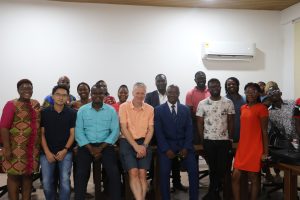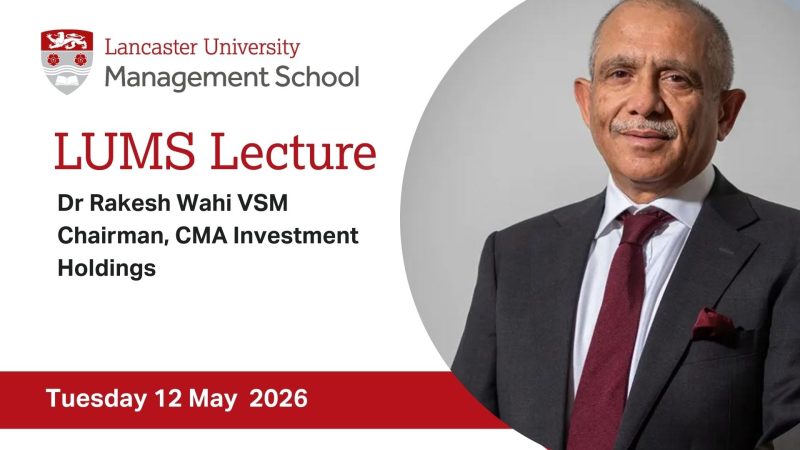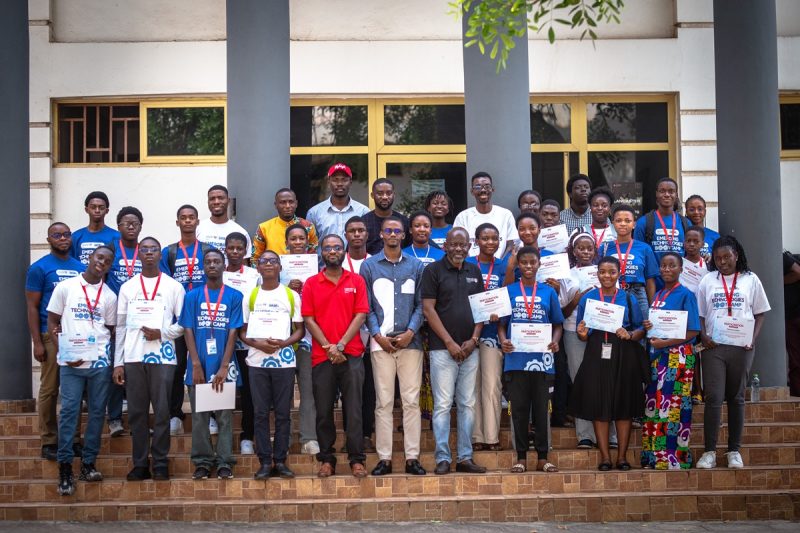On January 27, 2023, a masterclass was held for Cohort 7 of Lancaster University Ghana’s Executive MBA class to give a more practical insight into the module taught by Dr. Mark Shackleton of Lancaster University, UK.
The topic for the masterclass was “Ghana’s Economic Challenges and the Way Forward,” and this was delivered by Dr. Eric Akobeng, former UN Chief Economist (UNECA) and an Economics lecturer at Lancaster University Ghana. Dr. Akobeng spoke to the audience about the current economic challenges faced in Ghana and gave recommendations on how Ghanaians can ease themselves from these challenges.

Dr. Akobeng began by giving the class an overview of Ghana’s structural budget deficit. He explained to the class that a budget deficit is when government expenditure exceeds revenue. He added that if this perpetuates over time, it’s called a structural deficit, and it has been a dominant feature of Ghana’s economy since independence. Referencing the budget of Ghana, Dr. Akobeng mentioned that Ghana has consistently had a budget deficit with the exception of 2004, when the country completed the HIPC initiative.
He pointed out some key crises in various sectors that play a role in the current economic challenge. He mentioned that “during the energy crises in Ghana, the country signed a take or pay contract that led to Ghana paying GH12 billion for power not used in 2019, and GNPC also used US$250 million to settle the country’s gas obligations in the same year”. Citing these examples, Dr. Akobeng explained that the country was already suffering from a crisis even before COVID hit. He added that Ghana managed the COVID-19 virus well but suffered a combined fiscal impact of GH26 billion, or 6.8% of GDP, which affected both the demand and supply sides of the Ghanaian economy. He continued by stating that the country suffered an energy crisis, followed by COVID and then the Ukraine-Russian war, which affected agricultural production.

He continued the masterclass by stating that Ghana has some frameworks that check fiscal discipline. He stated that one of these frameworks is the Fiscal Responsibility Act of 2018 (ACT 982), which states the finance ministry must ensure that the country will at all times have a fiscal deficit of not more than 5% of GDP. The framework is also to ensure that there is a positive primary balance, which means that the country’s current revenue must be greater than its current expenditure, and lastly, a debt-to-GDP ratio of not more than 65%. Dr. Akobeng stated that “in 2020, fiscal slippages due to COVID-19 resulted in an estimated fiscal deficit of 11.5% of GDP, and as a result, the public debt to GDP ratio continued to rise”. He also added that “rising inflation has heightened the cost of living for Ghanaians, particularly for food, and the drivers of inflation as of October 2022 were 43.7% of imported inflation and 39.1% of domestic inflation, of which 43.7% was food inflation and 37.5% was non-food inflation”. Following this, Dr. Akobeng mentions that the increase in the price of imported food, high import costs, depreciation of the cedi, and high internal distribution costs due to increases in fuel prices were the major causes of the increase in the price of imported food in Ghana in 2022.

Speaking on the current state of Ghana’s economy, Dr. Akobeng mentioned that “on October 17th, 2022, a report by Bloomberg pointed out that the Ghanaian cedi was the worst performing currency in the world, and fast forward into 2022, Ghana is hoping to receive as much as US$ 3 billion from the IMF. Making it the 18th time since independence that Ghana has turned to the IMF for help”.

Giving some recommendations to the class on how Ghana can solve its economic crises, Dr. Akobeng stated that “review the tax system to make the property rate system a major part of central government revenue mobilization”. He added that “Ghana should develop a strategic framework to explore the formalisation of the exports of human (capital) resources”. He also suggested that the government should reduce the E-levy from the current 1% to 0.5 to help ease the financial burden on citizens. Lastly, he stated that industrial developments are to be decentralised to exploit the resource endowments.

About the LU Ghana EMBA Masterclass
The EMBA masterclass is an engagement designed around taught modules of the EMBA programme with industry speakers. These masterclass sessions form and strengthen the relationship between industry and academia in support of our students’ personal, professional and leadership development.
About the Speaker
Dr. Eric Akobeng is an Economics Lecturer at Lancaster University Ghana. Prior to his appointment, Eric worked as a Graduate Teaching Assistant at the University of Leicester, where he won the 2015 award for outstanding teaching. Dr. Eric’s particular research interests are in poverty, household consumption, migration and remittances, financial development, and institutions. He is an alumnus of the Universities of Ghana and Manchester (UK). He obtained his PhD in Economics from the University of Leicester (UK).
Dr. Eric currently serves as a Senior Technical Adviser on development and economic issues to the Ghana National Development Planning Commission. He worked as a Chief Budget Analyst with the Ghana Ministry of Finance and Economic Planning, and as a Coordinating Director with the Local Government Service for 22 years. He had the opportunity to coordinate International Labour Organization, World Bank, African Development Bank, UNICEF, and UNFPA projects.




